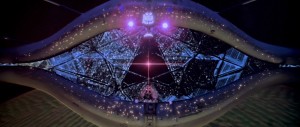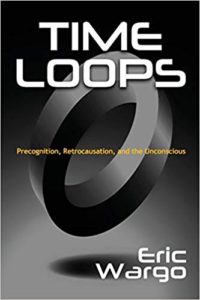The Noömass Hypothesis: Is Dark Matter Made of Knowledge?
. . . In that Empire, the Art of Cartography attained such Perfection that the map of a single Province occupied the entirety of a City, and the map of the Empire, the entirety of a Province. In time, those Unconscionable Maps no longer satisfied, and the Cartographers Guilds struck a Map of the Empire whose size was that of the Empire, and which coincided point for point with it. (Borges, “On Exactitude in Science”)
I’ve argued previously that the idea of expanding spheres of colonization—ships full of families settling on new planets, having more families, etc.—fails to reflect our own destiny as immortal creatures and thus may be an unlikely agenda for extraterrestrial civilizations either. Yet if we confine interstellar “expansion” to the expansion of the noösphere, the enlargement of knowledge of the cosmos, then a more realistic picture emerges, one that conforms not at all badly to the long history of human interaction with seemingly nonhuman technology (leaving aside humanoid visitors—I’m referring mainly to orbs, spheres, and other technologies that don’t seem like they have little pilots inside).
Mathematical models (such as presented in a recent article by two mathematicians in Scotland, Arwen Nicholson and Duncan Forgan) dictate that the earth should long ago have been visited by extraterrestrial Von Neumann probes. As I suggested in a post on such probes, it seems reasonable to assume that since long before there were people and even long before there was life here, this planet has played host to automated surveillance technology, roving science platforms, probably having multiple origins but “living” right here. And we’d be unexceptional—just one of billions of worlds similarly swarming with intelligent surveillance machines taking various forms.
Needless to say, such a knowledge-gathering project undertaken for billions of years by numerous separate ET intelligences would produce, over the aeons, more than mere mountains of data. There would need to be some material or energetic substrate or “server” to support this knowledge. What if the invisible “dark matter” that is needed to make our current cosmological models consistent consists partly or even entirely of noömass, matter/energy that has been metabolized into information and that advanced intelligences have perhaps sequestered into the very folds of spacetime?
Borges imagined a map as big as the country it represented; perhaps there are already many maps nearly as big and as detailed as the rest of the (dwindling) universe. It may not be only a known universe but a multiply known universe—known and re-known many many times over, in such detail that it can be inhabited and manipulated and remade for countless alien experiencers, countless knowers ancient and immortal, some of whom arose long before our planet even formed. Their ubiquitous drone science platforms scour and record “all that is knowable” and, ultimately, may assimilate the rest of the universe (what is left, what we still see with our telescopes).
The Russian Cosmist Vladimir Vernadsky, who first coined the term noösphere, was referring to the collection of human scientific knowledge, the sheath of “thinking matter” that surrounds the earth; it is a concept that has been compared to the “Akashic Record” consulted by clairvoyants in the Theosophical and Anthroposophical tradition. What if the collected record of the entire Cosmos, mechanically archived and updated by the ancient machines of dawn sentiences, is really out there (and everywhere)?
“V’ger” in the first (and I think way underrated) Star Trek movie was an ancient, autistic machine intelligence scouring the galaxy to “know all that is knowable,” assimilating everything into a vast, hyper-detailed representation. I wonder: Could just a few thousand or a few million V’gers across the universe, all with the same idea, end up devouring the whole thing, metabolizing the unknown into the known?
The “known universe,” in other words, could be just that, literally: known, and in far greater detail, by someone else, or lots of someone elses. What’s missing from what we see—all that “dark matter”—could be precisely their knowledge of what we see, which includes their knowledge of us.
Perhaps we should give up looking for radio signals and dim Dyson Spheres (imagining advanced extraterrestrials to still be biologically based “civilizations” huddled around their stellar campfires) and start looking for pure information, something like the Akashic Record, more massive than the visible universe, enfolded in the fabric of spacetime itself.
___






Hi Eric,
I wanted to thank you for what I felt was a truly refreshing and intelligent hypothesis.
I will state however, that according to the paradigms we are familiar with, knowledge storage gets smaller, not larger.
IMO, I hardly think that something that theoretically relegates known space to such an insignificant percentage of the universe’s overall mass would be required to store such a data base. Maybe the other way around, but then again that’s due to my phenomenalism mentality.
Personally, I find the ETH ludicrous, but for very different reasons than those typically cited.
Albeit, your theory presents a very interesting aspect to consider.
Even though I do find it incredulous that most would accept the ETH from the stance that cultural programming us utterly responsible for it’s origin, and thereby, making those within our times guilty of the same precise mistakes that our historic forerunners made with respect to their superstitions and folklores relating to a myriad of UFO centered phenomena, I am willing to change my position in an instant if I were only able to see something within the ETH besides personification through cultural awareness.
However, I simply cannot find as much at this time.
I BELIEVE HOWEVER, in consciousness information that our cognizant abilities reconcile to a relative, thereby survivable state of existence, wherein we experience everything we know as reality post experience.
Good Luck To You Eric!
I appreciate your willingness to be, and think, new. It’s a rare gift for which this realm known as “ufology” seems absolutely devoid of most of the time.